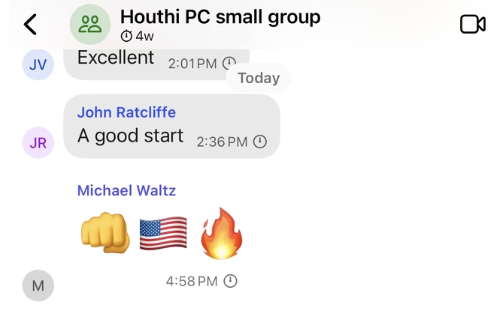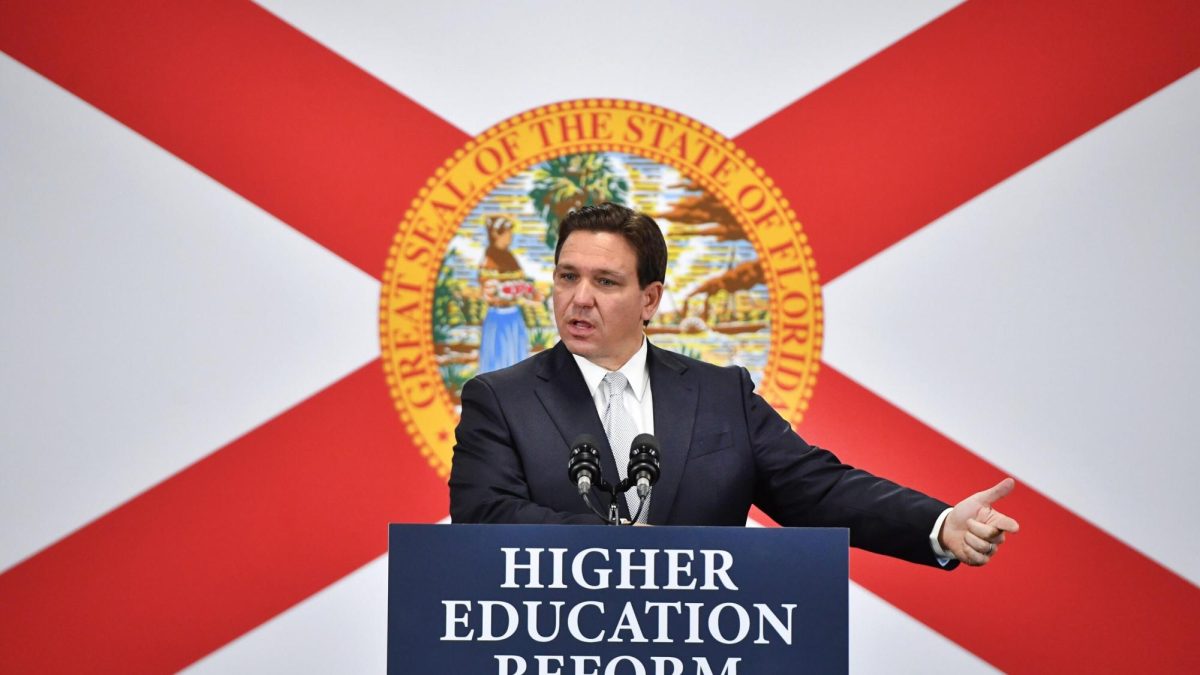On March 11th, 2025, Jeffrey Goldberg, editor in chief of The Atlantic, was added to a classified group chat about planned military strikes on Yemen. He had gotten a request from a user identified as Michael Waltz on Signal, an encrypted chatting service. Goldberg assumed that the user was not Waltz, the current U.S. National Security Advisor, but rather a nefarious actor trying to get information from the journalist. However, Goldberg accepted the connection request, hoping he would be chatting to the actual advisor.
Two days later–Thursday, March 17th—Goldberg was added to a Signal group chat called “Houthi PC small group.” Members of the group, primarily using codenames, were listed off. The chat consisted of 18 individuals, including various National Security Council officials and Vice President JD Vance. After consulting with several colleagues, Goldberg assumed the texts were likely part of a disinformation campaign, attempting to place journalists in misleading and embarrassing positions. His doubts were rooted in the disbelief that the national-security leadership of the United States would communicate on a chatting service about impending war plans. He also doubted the National Security Advisor to the president would be rash enough to include the editor in chief of The Atlantic in said chat.
The activities within the group chat only became more concerning as the week passed. A conversation arose about ambiguous plans and tasks for various members, including a noteworthy statement referring to the use of classified computer and communications systems. Although it is not uncommon for national security officials to communicate about meeting planning and other procedural matters on Signal, the government does not approve it for sharing classified information. There are specified systems placed by the government for this purpose. Notably, most cabinet-level national security officials have a specifically designed space installed in their homes known as a sensitive compartmented information facility. Using an online chatting service comes with far too many risks. Their phones could be hacked, stolen, or the editor in chief of The Atlantic could be added. Overall, the national security risks associated with using non-governmental approved communication systems are severe.
At 8:16 a.m. on Friday, March 14th, the account labeled “JD Vance” began sharing concerns about the risks of an ambiguous act that may disrupt foreign relations and trade. He also stated, “The strongest reason to do this is, as POTUS said, to send a message.” Significantly, the alleged Vance account went on to further explain how following through with this plan may jeopardize foreign policy, considering Vance has not openly diverged from the president’s position on essentially any issue. In response, an account named “Pete Hegseth,” the United States Secretary of Defense, brought up dodgy considerations of bailing out of the plan. In this message, Hegseth essentially leaked the United States’ impending military actions against the Houthis—an Islamic political and military organization in Yemen that attacked Israel. In summary, Hegseth explained that procrastination will not resolve concerns. Addressing Hegseth, Vance said, “If you think we should do it let’s go. I just hate bailing Europe out again.” It should be emphasized that America’s European allies benefit economically from the U.S. Navy’s protection of international shipping lanes. If something were to happen to these lanes, potentially a military strike, it would impact relations.
The next day, Hegseth posted a crucial update in the chat. In short, his post contained a detailed account of upcoming strikes on Yemen, including but not limited to information about targets, weapons the U.S. would be deploying, and attack sequencing. According to this text, the first detonation would be at 1:45 p.m. Eastern time on March 15th. The first strikes were reported in the capital city at 1:30. Following these attacks, the group chat flooded with praise of the victorious attack, including the widely recognized response by Waltz of three emojis: a fist, an American flag, and fire.
On the following Sunday, Goldberg removed himself from the signal group chat, understanding it would immediately notify the members that he had left. Goldberg then contacted members of the group, including Waltz, Hegseth, and other officials, with a variety of questions. Brian Hughes, the National Security Council spokesperson, responded by confirming the validity of the group chat. However, he denied that the information shared was a threat to national security. William Martin, a spokesperson for Vance, also cleared up the messages from the vice president, confirming that he has always been and will always be fully aligned with the president.
Another major issue with the Signal leak was the violation of federal records law, which states text messages about official acts are considered records that should be preserved. However, Waltz set some of the messages in the chat to disappear after a set number of weeks. Jason R. Baron, Professor of the Practice at the University of Maryland College of Information Studies and a former director of litigation at the National Archives and Records Administration, explained, “Intentional violations of these requirements are basis for disciplinary action.” It is worth taking into account that Donald Trump repeatedly demanded that Hilary Clinton be imprisoned after her email controversy that began in 2015. Clinton had been using a personal email address hosted on a private server while serving as U.S. Secretary of State. An FBI investigation was launched to determine if information had been improperly stored or transmitted. It was announced that Clinton had been “extremely careless” in handling classified information, but ultimately, there were no charges.
Since the leak, the White House press secretary, Karoline Leavitt, and Pete Hegseth have doubled down on the position that none of the messages were classified. However, other members and alumni—including former state department attorney Brian Finucane—said the specificity of the information shared suggests it was classified. The White House has declared the matter “closed,” expressing confidence in National Security Advisor Mike Waltz despite calls for further investigation. Additionally, a federal judge ordered the contents of the chat to be preserved, stemming from a lawsuit filed by American Oversight, a nonpartisan nonprofit enforcing the public’s right to government records. So far, the only oversight has been a letter from a bipartisan Senate call for an investigation of the Department of Defense. However, no significant administrative actions have been taken.
Works Cited:
https://www.theguardian.com/us-news/2025/mar/27/signal-investigation-bipartisan-letter
https://www.npr.org/2025/03/31/nx-s1-5345865/white-house-signal-group-chat-review
https://www.nytimes.com/interactive/2025/03/25/us/signal-group-chat-text-annotations.html





